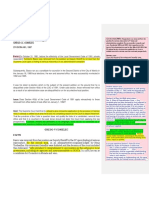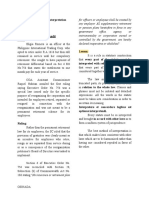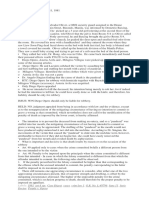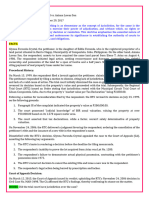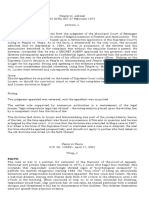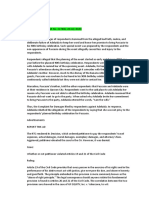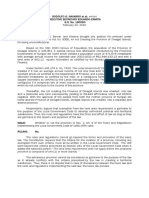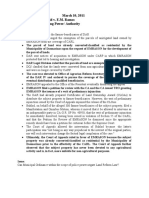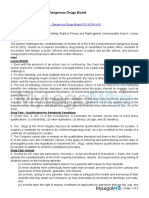0 ratings0% found this document useful (0 votes)
34 viewsBAYAN MUNA V ARROYO
BAYAN MUNA V ARROYO
Uploaded by
osoriojade28Digested by JLO
Copyright:
© All Rights Reserved
Available Formats
Download as DOCX, PDF, TXT or read online from Scribd
BAYAN MUNA V ARROYO
BAYAN MUNA V ARROYO
Uploaded by
osoriojade280 ratings0% found this document useful (0 votes)
34 views3 pagesDigested by JLO
Original Title
BAYAN MUNA v ARROYO
Copyright
© © All Rights Reserved
Available Formats
DOCX, PDF, TXT or read online from Scribd
Share this document
Did you find this document useful?
Is this content inappropriate?
Digested by JLO
Copyright:
© All Rights Reserved
Available Formats
Download as DOCX, PDF, TXT or read online from Scribd
Download as docx, pdf, or txt
0 ratings0% found this document useful (0 votes)
34 views3 pagesBAYAN MUNA V ARROYO
BAYAN MUNA V ARROYO
Uploaded by
osoriojade28Digested by JLO
Copyright:
© All Rights Reserved
Available Formats
Download as DOCX, PDF, TXT or read online from Scribd
Download as docx, pdf, or txt
You are on page 1of 3
Bayan Muna Party-List Representatives et al.
, Petitioners,
vs.
President Gloria Macapagal-Arroyo et al., Respondents.
GR No. January 10, 2023
182734
Ponente: Justice Samuel H. Gaerlan
Topic: The constitutionality of the Tripartite Agreement for Joint Marine
Seismic Undertaking (JMSU)
Facts of the A tripartite agreement for Joint Marine Seismic Undertaking
Case: (JMSU) was signed on March 14, 2005, by the China National
Offshore Oil Corporation (CNOOC), Vietnam Oil and Gas
Corporation (PETROVIETNAM), and the Philippine National Oil
Company (PNOC). The JMSU took effect on July 1, 2005 and was
set to expire on June 30, 2008.
The agreement, covering 142,886 square kilometers in the West
Philippine , aimed to jointly explore petroleum resources and was
approved by the Philippine government.
The petitioners filed a petition for certiorari and prohibition on
May 21, 2008, asserting that the JMSU violated a certain
provision of the 1987 Constitution.
Issue/s: Whether former President Gloria Macapagal-Arroyo has
presidential immunity from being impleaded in this lawsuit.
Whether the writs of certiorari and prohibition are proper to
assail the constitutionality of the JMSU.
Whether the doctrine of hierarchy of courts was violated.
Whether the petitioners have legal standing to challenge the
JMSU as legislators and taxpayers.
Whether the Tripartite Agreement for JMSU is
unconstitutional.
Arguments of The petitioners argued that the JMSU is unconstitutional
the because it allows foreign corporations to engage in the
Petitioner/s: exploration of Philippine natural resources, violating Section
2(1), Article XII of the 1987 Philippine Constitution, which
mandates that such activities must be under the full control
and supervision of the State.
They contended that the agreement is not valid due to the
absence of required approvals, as agreements regarding the
exploration of natural resources must be signed by the
President and have the congressional approval.
The argued that the seismic survey conducted under the
JMSU constitutes "exploration" within the constitutional
definition.
They maintained that they possess legal standing to
challenge the JMSU because the case raises significant
constitutional issues pertaining to resource sovereignty and
national interest being legislators, taxpayers and citizen of
the republic.
The petitioners also highlighted that their direct filing with
the Supreme Court is justified due to the grave constitutional
issues at stake and the urgent need for judicial intervention.
Argument of The respondents argued that former President Arroyo should
the not be impleaded as a respondent in the lawsuit based on
Respondent: the principle of presidential immunity.
They contended that the appropriate legal remedy for the
petitioners should be an ordinary civil suit for annulment of
contract in the RTC rather than the direct challenge being
made through the petition for certiorari and prohibition in the
Supreme Court.
They claimed that the JMSU is primarily a preliminary
research activity and thus does not infringe upon
constitutional provisions does not involve actual exploration.
They argued that the petitions for writs of certiorari and
prohibition to contest its constitutionality may not be
appropriate.
Supreme The Supreme Court ruled that former President Gloria
Court Ruling: Macapagal-Arroyo is immune from being impleaded in the
lawsuit while in office. This immunity preserves the dignity of
the presidential office and prevents distractions from official
duties.
The SC held that the writs of certiorari and prohibition are
proper remedies to challenge the constitutionality of the
JMSU since the case involved significant constitutional
questions regarding the exploitation of natural resources.
The SC found no violation of the doctrine of hierarchy of
courts and that direct filing with the Supreme Court was
justified due to the importance of the constitutional issues
raised.
The SC ruled that the petitioners, as members of the
legislature and taxpayers, have legal standing to challenge
the JMSU.
The Supreme Court declared the JMSU unconstitutional
because it allowed foreign corporations to participate in the
exploration of the Philippines' natural resources without
adhering to the safeguards prescribed in Section 2, Article XII
of the 1987 Constitution. The JMSU was deemed to involve
"exploration" and thus required strict compliance with
constitutional provisions regarding the utilization of natural
resources.
Doctrine/ Presidential Immunity from Suit
Principle: Principle of Constitutional Construction- Verba legis
Locus Standi
You might also like
- DR Hari Krishnan & Anor V Megat Noor Ishak Bin Megat Ibrahim & Anor and Another AppealDocument45 pagesDR Hari Krishnan & Anor V Megat Noor Ishak Bin Megat Ibrahim & Anor and Another AppealChin Yuh HerngNo ratings yet
- Bacani v. Nacoco, 100 Phil. 468Document4 pagesBacani v. Nacoco, 100 Phil. 468martina lopezNo ratings yet
- Nov 4 - Marlon Curammeng y Pablo V People of The PhilippinesDocument2 pagesNov 4 - Marlon Curammeng y Pablo V People of The Philippinesrafael.louise.roca2244No ratings yet
- BPI v. CBP, G.R. No. 197593, October 12, 2020Document9 pagesBPI v. CBP, G.R. No. 197593, October 12, 2020Reynald CruzNo ratings yet
- #40 Office of The Ombudsman V CADocument2 pages#40 Office of The Ombudsman V CAAnonymous fnlSh4KHIgNo ratings yet
- PP Vs ManabaDocument1 pagePP Vs ManabaDanny DayanNo ratings yet
- GREGO vs. COMELEC Case DigestDocument15 pagesGREGO vs. COMELEC Case DigestRai-chan Junior ÜNo ratings yet
- Estrada vs. Sandiganbayan (2001)Document2 pagesEstrada vs. Sandiganbayan (2001)reginaNo ratings yet
- Colgate-Palmolive Phils., Inc. v. Gimenez, G.R. No. L-14787, (January 28, 1961), 110 PHIL 874-878Document1 pageColgate-Palmolive Phils., Inc. v. Gimenez, G.R. No. L-14787, (January 28, 1961), 110 PHIL 874-878Danielle Therese TempladoNo ratings yet
- Gonzales vs. HechanovaDocument1 pageGonzales vs. HechanovaicesootNo ratings yet
- Ching V GoyankoDocument2 pagesChing V GoyankoKyle TutorNo ratings yet
- Allarde vs. Commission On Audit Et AlDocument1 pageAllarde vs. Commission On Audit Et AlEJ PaduaNo ratings yet
- (Stat Con) LINGUISTIC CANONS OF INTERPRETATIONDocument7 pages(Stat Con) LINGUISTIC CANONS OF INTERPRETATIONMonique OsinadaNo ratings yet
- PEOPLE V OPERO DigestDocument1 pagePEOPLE V OPERO DigestHerbert EsquibalNo ratings yet
- (Case No. 336) : Prepared By: Cecille Diane DJ. MangaserDocument2 pages(Case No. 336) : Prepared By: Cecille Diane DJ. MangaserCecille MangaserNo ratings yet
- Equatorial Realty Development Et Al Vs Mayfair Theater DECISION PDFDocument4 pagesEquatorial Realty Development Et Al Vs Mayfair Theater DECISION PDFDianalyn QuitebesNo ratings yet
- REYES Vs NHADocument1 pageREYES Vs NHAJen DeeNo ratings yet
- 4 People VS VillacorteDocument8 pages4 People VS VillacorteJudy Ann MaderazoNo ratings yet
- Glynna Foronda-Crystal Vs Aniana LawasSon G.R. No. 221815 November 29, 2017Document9 pagesGlynna Foronda-Crystal Vs Aniana LawasSon G.R. No. 221815 November 29, 2017MakilingE.CarlosNo ratings yet
- Minucher Vs ScalzoDocument8 pagesMinucher Vs Scalzoyanyan yuNo ratings yet
- People v. Buenviaje, 47 Phil. 536Document5 pagesPeople v. Buenviaje, 47 Phil. 536JNo ratings yet
- Agustin V Edu, 88 SCRA 195 (1979)Document3 pagesAgustin V Edu, 88 SCRA 195 (1979)Gabriel HernandezNo ratings yet
- Exercise1 PassivevoiceDocument14 pagesExercise1 PassivevoiceChing ApostolNo ratings yet
- StatCon Case DigestDocument10 pagesStatCon Case DigestNINA FRANCINE YUNo ratings yet
- Stanfilco DigestsDocument16 pagesStanfilco DigestsPaula BitorNo ratings yet
- Stat Con Case DigestDocument17 pagesStat Con Case DigestGringo BarrogaNo ratings yet
- Kilosbayan Vs MoratoDocument1 pageKilosbayan Vs MoratoCarlo Jose BactolNo ratings yet
- In Re - Atty Felizardo de GuzmanDocument2 pagesIn Re - Atty Felizardo de Guzmansahara lockwoodNo ratings yet
- 132 - Villasenor V Oco-Pesquerra - GR No 180700Document11 pages132 - Villasenor V Oco-Pesquerra - GR No 180700IamtheLaughingmanNo ratings yet
- Republic Vs FelicianoDocument5 pagesRepublic Vs FelicianoAnthony Arcilla PulhinNo ratings yet
- 2 Anti Fencing - Cahulogan Vs PeopleDocument7 pages2 Anti Fencing - Cahulogan Vs PeopleRichard TenorioNo ratings yet
- Cruz vs. CA (And Umali) : - Francisco G.R. No. 122445, November 18, 1997 - 282 SCRA 188Document2 pagesCruz vs. CA (And Umali) : - Francisco G.R. No. 122445, November 18, 1997 - 282 SCRA 188Jp Karl Gonzales UliganNo ratings yet
- Amalea Vs RitaniaDocument10 pagesAmalea Vs RitaniaGaby DiovaniNo ratings yet
- Go Bangayan Vs BangayanDocument3 pagesGo Bangayan Vs BangayanOrange Zee MelineNo ratings yet
- 3 Province of Cotabato Vs GRPDocument3 pages3 Province of Cotabato Vs GRPCedrickNo ratings yet
- 2-Digested CASE-LIST-ARTS-19-36-pfrDocument27 pages2-Digested CASE-LIST-ARTS-19-36-pfrKatrina GageloniaNo ratings yet
- 149 Cocofed Vs RepublicDocument1 page149 Cocofed Vs RepublicJulius Geoffrey TangonanNo ratings yet
- City Government of Tagaytay v. Guerrero, GR 140734 & 140745, Sept. 17, 2009, 600 SCRA 33Document1 pageCity Government of Tagaytay v. Guerrero, GR 140734 & 140745, Sept. 17, 2009, 600 SCRA 33Gia DimayugaNo ratings yet
- La Bugal Bugal B' Laan Tribal, Inc. vs. Secretary of DENRDocument1 pageLa Bugal Bugal B' Laan Tribal, Inc. vs. Secretary of DENRAnneNo ratings yet
- Gallego Vs VerraDocument3 pagesGallego Vs VerraDianneNo ratings yet
- People v. GenosaDocument5 pagesPeople v. GenosaRic AlbanNo ratings yet
- De Villa v. Court of Appeals, G.R. No. 87416, (April 8, 1991), 273 PHIL 89-97Document1 pageDe Villa v. Court of Appeals, G.R. No. 87416, (April 8, 1991), 273 PHIL 89-97Danielle Therese TempladoNo ratings yet
- Aug 17 Digested Cases - Remedial Law ReviewDocument18 pagesAug 17 Digested Cases - Remedial Law ReviewHazel ValenciaNo ratings yet
- Singson Vs SingsonDocument2 pagesSingson Vs SingsonFrancise Mae Montilla MordenoNo ratings yet
- Emilio A. Gonzales III v. Office of The President, Etc., Et Al GR 196231 & Wendell Bareras-Sulit v. Atty. Paquito N. Ochoa, JR., Et Al. GR 196232Document50 pagesEmilio A. Gonzales III v. Office of The President, Etc., Et Al GR 196231 & Wendell Bareras-Sulit v. Atty. Paquito N. Ochoa, JR., Et Al. GR 196232Ronald Allan Moreno100% (1)
- Kuroda Vs JalandoninininiDocument2 pagesKuroda Vs JalandoninininiJuris Renier MendozaNo ratings yet
- RODOLFO G NAVARRO Et Al Versus EXECUTIVE SECRETARY EDUARDO ERMITA G R No 180050 February 10 2010Document1 pageRODOLFO G NAVARRO Et Al Versus EXECUTIVE SECRETARY EDUARDO ERMITA G R No 180050 February 10 2010D'Judds ManggadNo ratings yet
- CASE Digest Civil 2Document2 pagesCASE Digest Civil 2Broken0% (2)
- D.M. Consuji Vs Court of Appeals & Maria J. JuegoDocument2 pagesD.M. Consuji Vs Court of Appeals & Maria J. JuegoRae Angela GarciaNo ratings yet
- The Province of North Cotabato vs. The Gov't of The Rep. of The Phil Peace Panel On Ancestral Domain.Document3 pagesThe Province of North Cotabato vs. The Gov't of The Rep. of The Phil Peace Panel On Ancestral Domain.Michaella ReyesNo ratings yet
- Statcon Parts of Statute AssignDocument4 pagesStatcon Parts of Statute AssignGraziela MercadoNo ratings yet
- Ynot vs. IacDocument12 pagesYnot vs. IacKate DomingoNo ratings yet
- Marcos Vs Chief of Staff of The AFP DigestDocument1 pageMarcos Vs Chief of Staff of The AFP DigestRussell John HipolitoNo ratings yet
- 13 - Buklod NG Magbubukid v. E.M. RamosDocument2 pages13 - Buklod NG Magbubukid v. E.M. RamoschrisNo ratings yet
- People vs. Nazareno - TALAGADocument2 pagesPeople vs. Nazareno - TALAGAreginacarlatalagalawNo ratings yet
- Cabrera V LapidDocument2 pagesCabrera V LapidValerie Aileen AnceroNo ratings yet
- Art. 13 - US Vs Dela Cruz GR 7094Document2 pagesArt. 13 - US Vs Dela Cruz GR 7094Lu CasNo ratings yet
- Social Justice Society (SJS) Vs Dangerous Drugs Board 570 SCRA 410Document3 pagesSocial Justice Society (SJS) Vs Dangerous Drugs Board 570 SCRA 410Kael MarmaladeNo ratings yet
- Eastern Shipping Lines vs. POEA, 166 SCRA 533, G.R. No. L-76633, October 18, 1988Document11 pagesEastern Shipping Lines vs. POEA, 166 SCRA 533, G.R. No. L-76633, October 18, 1988JemNo ratings yet
- 28 - Case Digest - G.R. No. 182734 - Ocampo vs. Macapagal-ArroyoDocument3 pages28 - Case Digest - G.R. No. 182734 - Ocampo vs. Macapagal-ArroyoMira LeNo ratings yet
- 06 Bayan-Muna Party List Vs GMA-86 PagesDocument3 pages06 Bayan-Muna Party List Vs GMA-86 Pageskneecajoy.onlineworkNo ratings yet
- DefencesDocument15 pagesDefencesAlex LoveNo ratings yet
- Karlie Redd Baby Daddy Nate Hill Indictment DocumentsDocument9 pagesKarlie Redd Baby Daddy Nate Hill Indictment DocumentsJacky J. JasperNo ratings yet
- Didipio Earth-Savers' Multi-Purpose Association, Inc. (DESAMA) Et Al.v Elisea Gozun, Et Al. G.R. No. 157882 March 30, 2006Document65 pagesDidipio Earth-Savers' Multi-Purpose Association, Inc. (DESAMA) Et Al.v Elisea Gozun, Et Al. G.R. No. 157882 March 30, 2006RMC PropertyLawNo ratings yet
- The Constitution of The Philippine CommonwealthDocument3 pagesThe Constitution of The Philippine Commonwealtheydel_beeNo ratings yet
- Tarrosa vs. Singson Case DigestDocument1 pageTarrosa vs. Singson Case DigestArlene Q. Samante100% (1)
- Monika's Project ReportDocument35 pagesMonika's Project Reportmonika vermaNo ratings yet
- Observations With Regard To The Paragraph No. 11, 12 and 13Document2 pagesObservations With Regard To The Paragraph No. 11, 12 and 13arandaraNo ratings yet
- Preface and AcknowledgementDocument1 pagePreface and AcknowledgementVAGMEE MISHRaNo ratings yet
- (Ebooks PDF) Download The Chief The Life and Turbulent Times of Chief Justice John Roberts First Edition Biskupic Full ChaptersDocument34 pages(Ebooks PDF) Download The Chief The Life and Turbulent Times of Chief Justice John Roberts First Edition Biskupic Full Chaptersmiakawoop100% (1)
- Banking Law - Case Analysis - Rohit Yadav - 18010224151Document4 pagesBanking Law - Case Analysis - Rohit Yadav - 18010224151Rohit RaoNo ratings yet
- CLASSWORK DEC 17 - (Answer) - JOHVEN MARC FERROSDocument2 pagesCLASSWORK DEC 17 - (Answer) - JOHVEN MARC FERROSJOHANNA MARIE FERROSNo ratings yet
- Trespass to goods notesDocument22 pagesTrespass to goods notesNakawooya AlexasNo ratings yet
- 22.12.2021 Alternative Dispute Resolution (Clinical Course II) LLB SEM V 2019-22Document2 pages22.12.2021 Alternative Dispute Resolution (Clinical Course II) LLB SEM V 2019-22Nikhat HetavkarNo ratings yet
- English For Students of Public AdministrationDocument125 pagesEnglish For Students of Public Administrationsayed shahabuddin Adeeb100% (2)
- BrochureDocument18 pagesBrochuregurugriffer8No ratings yet
- Sources of International LawDocument42 pagesSources of International Lawshubham100% (2)
- Universal Textile Mills v. CourtDocument4 pagesUniversal Textile Mills v. CourtMaddison YuNo ratings yet
- Lunaria v. People GR 160127Document6 pagesLunaria v. People GR 160127JanMarkMontedeRamosWongNo ratings yet
- BLE 1-E 2022 Case ListDocument3 pagesBLE 1-E 2022 Case ListJulius SantosNo ratings yet
- Handbook of Admiralty LawDocument602 pagesHandbook of Admiralty LawThe Observer100% (2)
- PEYE 41 ClientDocument32 pagesPEYE 41 ClientpagnesultiNo ratings yet
- Practicum V Project (Admin Law) - Jerwin C. Tiamson-OldDocument5 pagesPracticum V Project (Admin Law) - Jerwin C. Tiamson-OldJerwin TiamsonNo ratings yet
- Relief For Judgment-Order - OrallerDocument4 pagesRelief For Judgment-Order - OrallerGracelle Mae OrallerNo ratings yet
- Papandayan, Jr. v. ComelecDocument2 pagesPapandayan, Jr. v. ComelecPaulo LucasNo ratings yet
- Judicial Affidavit of MR Fred PuzonDocument5 pagesJudicial Affidavit of MR Fred PuzonEarl YoungNo ratings yet
- United States v. Rashella Reed, 11th Cir. (2014)Document5 pagesUnited States v. Rashella Reed, 11th Cir. (2014)Scribd Government DocsNo ratings yet
- Nagaddya Another V Administrator General (Civil Suit 45 of 2021) 2024 UGHCFD 29 (27 June 2024)Document10 pagesNagaddya Another V Administrator General (Civil Suit 45 of 2021) 2024 UGHCFD 29 (27 June 2024)Kitimbo ShamiraNo ratings yet
- CSC V AppealDocument3 pagesCSC V Appealjeth saganaNo ratings yet
- HC Order WP 26700Document65 pagesHC Order WP 26700Shrihari RaoNo ratings yet






